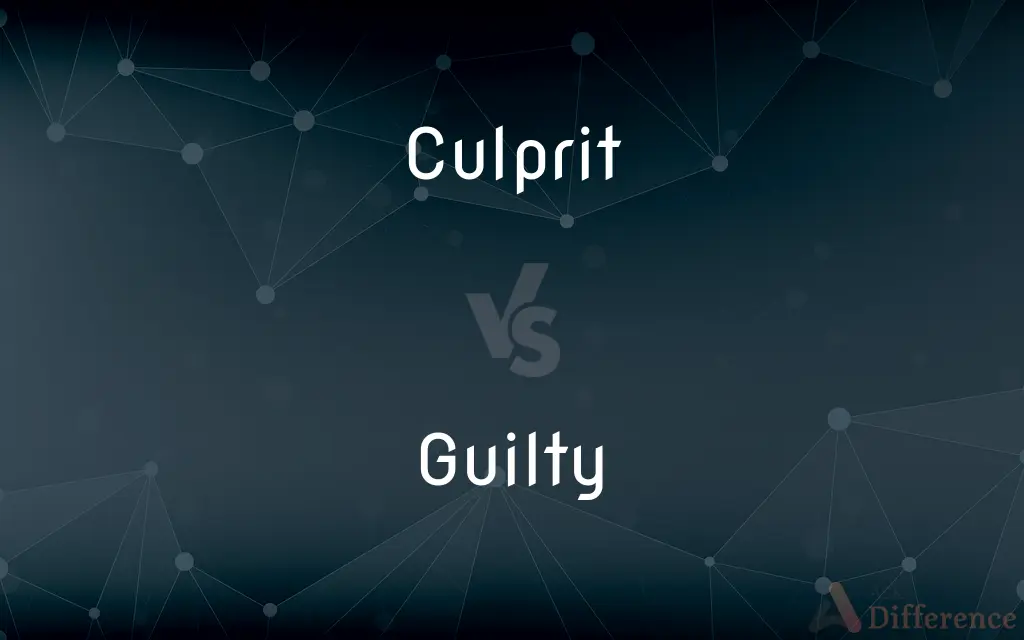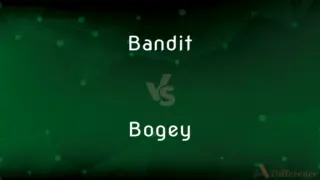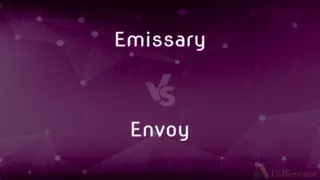Culprit vs. Guilty — What's the Difference?
Edited by Tayyaba Rehman — By Maham Liaqat — Updated on March 29, 2024
Culprit refers to a person responsible for a crime or misdeed, while guilty describes the state of being responsible for committing a crime or wrongdoing.

Difference Between Culprit and Guilty
Table of Contents
ADVERTISEMENT
Key Differences
The term "culprit" specifically identifies an individual or entity accused or deemed responsible for a particular fault or crime. In contrast, "guilty" is an adjective that characterizes the state or condition of having committed an offense or violation, highlighting the outcome of a judicial process or a personal acknowledgment of wrongdoing.
While "culprit" is used to pinpoint the source of a problem or the party responsible for an undesirable situation, "guilty" implies a legal or moral judgment passed on the actions or behavior in question. Guilty often comes with a sense of accountability and recognition of fault, whether in a court of law or in personal conscience.
A culprit is typically identified through investigation or evidence pointing to their involvement in a misdeed, indicating a direct link to an incident. On the other hand, being guilty not only acknowledges that link but also carries the implications of that association, such as legal consequences, remorse, or societal judgment.
In legal terms, a person becomes a culprit by virtue of their actions leading to an accusation, while guilt is established through a formal process, such as a trial, where evidence is evaluated to determine responsibility. Guilt carries the weight of the law and societal norms, reflecting a breach of legal or ethical standards.
The identification of a culprit often precedes the determination of guilt, as the legal system seeks to establish who may be responsible for an act before adjudicating their guilt or innocence. Thus, while all culprits are accused of wrongdoing, not all are ultimately found guilty as charged.
ADVERTISEMENT
Comparison Chart
Definition
A person accused of a crime
The state of having committed a crime
Context
Identification of responsibility
Legal or moral judgment
Focus
On the individual's action
On the outcome of actions
Legal Process
Accusation or suspicion
Conviction or admission of wrongdoing
Associated Feelings
Blame or suspicion
Remorse, shame, responsibility
Compare with Definitions
Culprit
Accused individual.
The culprits were brought before the court for sentencing.
Guilty
Associated with fault.
They pleaded guilty to avoid a lengthy trial.
Culprit
Person responsible for a crime.
The police arrested the main culprit behind the burglary.
Guilty
Responsible for wrongdoing.
She felt guilty for arriving late and missing the meeting.
Culprit
Source of misdeed.
Investigators are still looking for the culprit of the cyber attack.
Guilty
Feeling remorse.
The guilty feeling haunted her for years after the incident.
Culprit
Cause of a problem.
Overfishing is the primary culprit in the depletion of marine life.
Guilty
Legally convicted of a crime.
The jury found the defendant guilty of theft.
Culprit
One who is blamed.
He was quickly identified as the culprit in the failed project.
Guilty
Responsible for a reprehensible act; culpable.
Culprit
A culprit, under English law properly the prisoner at the bar, is one accused of a crime. The term is used, generally, of one guilty of an offence.
Guilty
(Law) Found to have violated a criminal law by a jury or judge.
Culprit
One charged with an offense or crime.
Guilty
Deserving blame, as for an error
Guilty of misjudgment.
Culprit
One guilty of a fault or crime.
Guilty
Suffering from or prompted by a sense of guilt
A guilty conscience.
Culprit
The person or thing at fault for a problem or crime.
I have tightened the loose bolt that was the culprit; it should work now.
Guilty
Suggesting or entailing guilt
A guilty smirk.
A guilty secret.
Culprit
A prisoner accused but not yet tried.
Guilty
Responsible for a dishonest act.
He was guilty of cheating at cards.
Culprit
One accused of, or arraigned for, a crime, as before a judge.
An author is in the condition of a culprit; the public are his judges.
Guilty
(legal) Judged to have committed a crime.
The guilty man was led away.
Culprit
One quilty of a fault; a criminal.
Guilty
Having a sense of guilt.
Do you have a guilty conscience?
Culprit
Someone who perpetrates wrongdoing
Guilty
Blameworthy.
I have a guilty secret.
Guilty
(legal) A plea by a defendant who does not contest a charge.
Guilty
(legal) A verdict of a judge or jury on a defendant judged to have committed a crime.
Guilty
One who is declared guilty of a crime.
Guilty
Having incurred guilt; criminal; morally delinquent; wicked; chargeable with, or responsible for, something censurable; justly exposed to penalty; - used with of, and usually followed by the crime, sometimes by the punishment; as, guilty of murder.
They answered and said, He is guilty of death.
Nor he, nor you, were guilty of the strife.
Guilty
Evincing or indicating guilt; involving guilt; as, a guilty look; a guilty act; a guilty feeling.
Guilty
Conscious; cognizant.
Guilty
Condemned to payment.
Guilty
Responsible for or chargeable with a reprehensible act; or marked by guilt;
Guilty of murder
The guilty person
Secret guilty deeds
A guilty conscience
Guilty behavior
Guilty
Showing a sense of guilt;
A guilty look
The hangdog and shamefaced air of the retreating enemy
Common Curiosities
Can an object be a culprit?
Yes, in a non-legal context, objects or factors can be described as culprits if they cause problems or issues.
What is a culprit?
A culprit is someone accused or found responsible for a crime or misdeed.
Is feeling guilty the same as being guilty?
Feeling guilty involves personal remorse or acknowledgment of wrongdoing, while being legally guilty involves formal recognition of one's responsibility for a crime.
How is a culprit determined?
A culprit is determined through investigation, evidence, and sometimes legal proceedings that link them to a crime.
What does it mean to be guilty?
Being guilty means having committed an offense or crime, either by legal conviction or personal admission.
Can someone be a culprit but not guilty?
Yes, someone can be accused as a culprit but later found not guilty in a court of law or upon further examination.
Is the term "culprit" always negative?
While primarily used in negative contexts, "culprit" is a neutral term identifying someone responsible for a specific act or condition.
Can animals be considered culprits?
In informal contexts, animals can be humorously referred to as culprits when they cause trouble or mischief.
Can societal norms influence perceptions of guilt?
Yes, societal norms and cultural values play a crucial role in shaping perceptions of guilt and the severity of offenses.
What happens after someone is found guilty?
After being found guilty, individuals may face legal consequences, such as fines, community service, or imprisonment, depending on the severity of the crime.
Can guilt affect someone's mental health?
Yes, persistent feelings of guilt can significantly impact mental health, leading to stress, anxiety, and depression.
Can guilt be a feeling only?
Yes, guilt can be purely a personal feeling of remorse or regret for one's actions, unrelated to legal guilt.
Does a guilty verdict always mean imprisonment?
Not necessarily; legal consequences vary widely based on the crime, jurisdiction, and specific circumstances of the case.
How can someone prove their innocence if accused as a culprit?
Proving innocence may involve presenting counter-evidence, witness testimony, or disproving the evidence against them.
Are there different degrees of guilt?
Legally, there can be degrees of guilt based on the severity of the crime; personally, the intensity of guilt feelings can also vary.
Share Your Discovery

Previous Comparison
Bandit vs. Bogey
Next Comparison
Emissary vs. EnvoyAuthor Spotlight
Written by
Maham LiaqatEdited by
Tayyaba RehmanTayyaba Rehman is a distinguished writer, currently serving as a primary contributor to askdifference.com. As a researcher in semantics and etymology, Tayyaba's passion for the complexity of languages and their distinctions has found a perfect home on the platform. Tayyaba delves into the intricacies of language, distinguishing between commonly confused words and phrases, thereby providing clarity for readers worldwide.














































